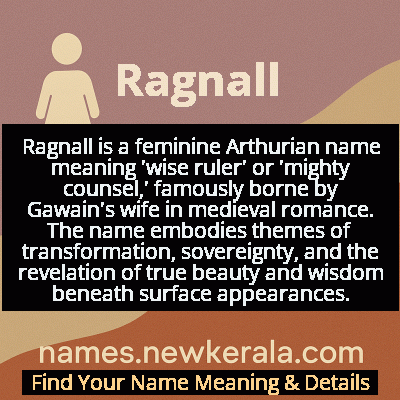Ragnall Name Meaning & Details
Origin, Popularity, Numerology Analysis & Name Meaning of Ragnall
Discover the origin, meaning, and cultural significance of the name RAGNALL. Delve into its historical roots and explore the lasting impact it has had on communities and traditions.
Name
Ragnall
Gender
Female
Origin
Arthurian
Lucky Number
2
Meaning of the Name - Ragnall
Ragnall is a feminine Arthurian name meaning 'wise ruler' or 'mighty counsel,' famously borne by Gawain's wife in medieval romance. The name embodies themes of transformation, sovereignty, and the revelation of true beauty and wisdom beneath surface appearances.
Ragnall - Complete Numerology Analysis
Your Numerology Number
Based on Pythagorean Numerology System
Ruling Planet
Moon
Positive Nature
Diplomatic, friendly, artistic, empathetic.
Negative Traits
Over-sensitive, moody, indecisive, prone to self-pity.
Lucky Colours
Green, cream, white.
Lucky Days
Monday.
Lucky Stones
Pearl, moonstone.
Harmony Numbers
1, 3, 4.
Best Suited Professions
Diplomats, mediators, caregivers, artists.
What People Like About You
Cooperative spirit, friendliness, artistic talent.
Famous People Named Ragnall
Ragnall ingen Amlaíb
Medieval Irish Princess
Queen of Northumbria through marriage to Sitric Cáech, played significant role in Norse-Gaelic politics
Ragnall Mac Gofraid
Norse-Gaelic Queen
Ruler in the Hebrides, maintained Norse cultural influence while integrating with Gaelic society
Ragnall of Mann
Norse Queen Regent
Acted as regent for her son, preserving Norse sovereignty in the Isle of Man during political transitions
Name Variations & International Equivalents
Click on blue names to explore their detailed meanings. Gray names with will be available soon.
Cultural & Historical Significance
Beyond the Arthurian context, Ragnall appears in historical records as a name borne by several Norse-Gaelic noblewomen, particularly in Ireland and Scotland during the Viking Age and medieval period. These historical Ragnalls often served as political bridges between Norse settlers and native Gaelic populations, sometimes ruling in their own right or as regents for their children. The name's persistence in these regions demonstrates the complex cultural synthesis that occurred between Scandinavian invaders and Celtic inhabitants, creating a unique Hiberno-Norse identity that valued strong female leadership and diplomatic acumen.
Extended Personality Analysis
Individuals named Ragnall typically exhibit a remarkable combination of intellectual depth and practical wisdom. They are natural problem-solvers who approach challenges with strategic thinking and emotional intelligence, often seeing solutions that others miss. Like the Arthurian character, they possess an inner strength that allows them to maintain dignity and purpose even in difficult circumstances. Ragnalls tend to be independent and self-possessed, valuing authenticity over social conformity and demonstrating the courage to be themselves regardless of external judgments.
Their personality often includes a transformative quality—the ability to grow and adapt significantly throughout their lives. They may appear reserved or unconventional at first meeting, but reveal profound depth and warmth to those who earn their trust. Ragnalls typically excel in roles that require mediation, counsel, or leadership, bringing a balanced perspective that considers both tradition and innovation. They have a natural authority that comes from competence rather than aggression, and they often serve as moral compasses in their communities or professions. Their strength lies in their integrity and their ability to remain true to their principles while navigating complex social landscapes.
Modern Usage & Popularity
Ragnall remains an exceptionally rare name in contemporary usage, with virtually no presence in modern birth records or popularity charts. Its usage is primarily confined to historical fiction, Arthurian enthusiast communities, and academic circles studying medieval literature. The name occasionally appears in fantasy literature and games that draw from Arthurian mythology, but it has not experienced the revival seen with other medieval names like Isolde or Guinevere. In recent years, there has been minor interest among parents seeking unique mythological names with strong female associations, particularly those with Norse and Celtic heritage. However, the name's unusual sound and specific Arthurian connection limit its broad appeal. It remains a name chosen by parents with particular interest in medieval history or Arthurian legends rather than those following naming trends.
Symbolic & Spiritual Meanings
Ragnall symbolizes the profound truth that wisdom and inner beauty transcend physical appearance, representing the archetype of transformation through acceptance and respect. The name carries the symbolic weight of sovereignty—both personal autonomy and rightful authority—suggesting that true power emerges from self-knowledge and integrity rather than external validation. It embodies the concept of the wise counselor whose guidance comes from deep understanding rather than force, and the idea that leadership based on wisdom creates more lasting change than rule through domination. The transformation motif central to the Arthurian Ragnall story symbolizes spiritual enlightenment and the revelation of one's true nature when freed from judgment and constraint. The name also represents cultural synthesis and the bridging of traditions, suggesting that strength comes from integrating diverse influences rather than maintaining rigid boundaries.

